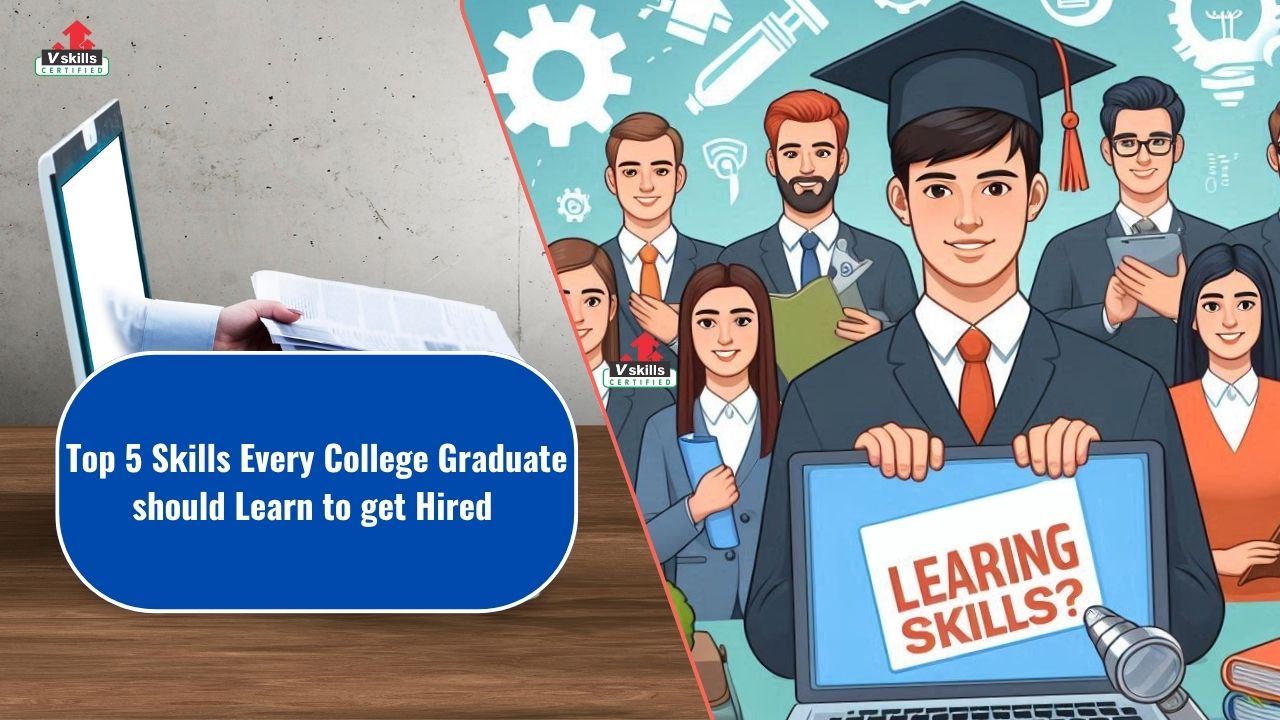“You’re hired!” – These are the words every college graduate dreams of hearing. But here’s a harsh truth: A degree alone won’t get you there. The job market today is not what it was a decade ago. Employers are no longer impressed by just good grades or a degree. They want candidates with unique skill sets who can do tasks as asked within real -life scenarios. Unfortunately, colleges do not provide these necessary skills in their curriculum. This becomes the reason for rejection in job interviews for a lot of graduate students who have been in the dark about the importance of these skills. With this immensely growing population and saturated market, employers look for job candidates with something new and fresh to offer to their organization. So, it becomes essential for an individual, especially for a college graduate, to be aware of these skills so that they can act upon them within time and make the most of them.
The motive for obtaining the experience and skill is to do the physical work. While soft skills like communication and adaptability are very high in demand, they are very generic in nature. Hard skills like data literacy and coding are tangible, which get actual results and are more profitable in the future. These skills make sure that you are job-ready from the day of your employment, which is very appealing to employers.
In this blog, we are going to discuss these very tangible skills that will make a difference in your resume and in your job experience.
1. DIGITAL LITERACY | Skills to Learn as a College Graduate
We live in an age where technology exists in every part of our lives. From work and education to communication and creativity, without technology the current generation is highly dependent on various aspects of technology. Digital literacy is the ability to confidently use technologies to handle information. Understanding digital tools like Google Workspace, Microsoft Office, social media platforms etc. To their most effective use. It teaches you how to send clear emails and communicate through cloud-based tools.
Why is it important?
- Workplace Relevance: From sending emails to creating spreadsheets, attending virtual meetings, or using online websites, digital fluency enhances productivity and makes you employable in an evolving job market.
- Empowered learning: There has been a boom in the education field with a variety of courses related to almost every career path of career like online courses, webinars, and digital libraries. But it takes digital literacy to navigate these platforms, evaluate resources, and absorb information effectively.
- Smarter Decision-Making: The internet is flooded with data but not all of it is accurate. Digital literacy helps you filter misinformation, verify sources, and make informed decisions. This can save you from all kinds of fraud as otherwise it can turn out to be a very fatal mistake, so it is always better to stay prepared ahead of time.
- Social engagement: The whole world is present on one social media platform or the other. Every kind of communication or transfer of the most important world events takes place on these platforms which makes them very crucial to be accessible to almost everyone at all times. Being digitally literate empowers you to engage in social discussions and be aware of your surroundings.
How to Learn?
- Explore New Tools: Try out productivity apps, experiment with blogging platforms, or build a personal portfolio website.
- Practice Safe Browsing: Learn about cybersecurity basics—use strong passwords, update software regularly, and recognize suspicious links.
- Help Others: Teaching someone else, whether it’s a friend or family member, can reinforce your own learning.
- Get certified: Vskills offers a certified course on digital skills that is world-renowned, which helps you attain the certificate for easy job application and teaches you actual worthwhile skills to do your work efficiently.
2. BASIC PROGRAMMING | Skills to Learn as a College Graduate
Once popular in the technological sector, basic coding and programming skills are now a must from the academic field to the creative ones. It makes its way to almost everyone and has been thriving and flourishing ever since. All that’s asked of us is to grow with it side by side to work to our full capability. Becoming a full-fledged software developer is not always the goal, but basic programming skills do not go to waste for sure and always come in handy.
Basic programming means understanding how to write and read simple code and using logic to solve problems. It includes writing simple scripts, understanding variables and functions, and creating small programs like web pages.
Why is it important?
- Boosts Problem-Solving and Logical Thinking: Programming teaches you how to break problems into smaller steps and troubleshoot in case of emergencies effectively. These skills are useful in any profession, even outside of tech.
- Makes You More Self-Sufficient: Want to tweak a website, clean up a spreadsheet with code, or automate a daily task? Basic programming gives you the tools to do more on your own without always relying on outsourced resources to do so these small tasks. This can save a ton of money for your company and for you as well.
- Improves Career Versatility: Digital transformation is happening in every industry. If you know how code works, even at a basic level, you can communicate better with developers, contribute to tech-driven projects, and stay competitive in the job market. It can also prove to be helpful while changing careers to a code-based sector.
- Powers Creative Projects: From building a blog to designing a simple game or interactive art, programming can unlock your creative potential in new and unexpected ways. You might think art and creativity are limited to a sheet of paper, but programming opens gateways that are filled of opportunities you might have never thought existed.
- Gateway to Advanced Tech Skills: Once you’re comfortable with the basics, you’ll be ready to explore advanced topics like data science, machine learning, app development, or cybersecurity fields that are in high demand. If the basics of the course are appealing to you and catch your interest, you can always go for its professional certification to get a nicer bullet point on your resume.
How to Learn?
- 1. Choose a Beginner-Friendly Language: Start with Python, which is great for general use and readability, or JavaScript, which is ideal for web development. These are very easy and ideal languages to start with to begin coding.
- Build Mini Projects: Create a personal website, a to-do list app, or a beginner’s level game. Practice makes perfect, so gaining experiential learning is the key to mastering any skill that you want to acquire.
- Practice Regularly: Coding is like learning a new language; the more you practice, the more fluent you become.
- Get certified: Vskills offers a number of programming courses in various fields which can help candidate differentiate in today’s competitive job market, broaden their employment opportunities by displaying their advanced skills, and result in higher earning potential.
3. BUSINESS ANALYTICS AND METRICS | Skills to Learn as a College Graduate
The skill of analyzing is not limited only to data scientists. It is now frequently used in fields like marketing, operations, finance, sales, and even HR. Business Analytics is the practice of using data to uncover insights, patterns, and trends that transform business strategy.
Why is it important?
- Data-Driven Decision-Making: In this highly risky and competitive environment, you cannot make decisions based on your gut feeling. You need proper proof and evidence to back up your claims. With analytics, you can back every strategy with evidence, which leads to better outcomes and lower risk.
- Universal Relevance Across Industries: From healthcare to retail to tech, every sector relies on data. Whether you’re a marketer tracking engagement or a product manager analyzing user behavior, analytics plays a major part at every step of the way.
- Improved Business Performance: By tracking the right metrics like conversion rates, customer acquisition costs, or churn, you can foresee performance and seize new opportunities faster. This increases the time of the results and makes you look good and efficient in front of your superiors.
- Career Boost and Marketability: Analytics skills are among the top in-demand abilities according to LinkedIn and job market reports. Whether you’re climbing the ladder or switching careers, it gives you a competitive edge.
How to Learn?
- Start with the Basics: Learn key metrics like KPIs, ROI, CAC, LTV, conversion rate, churn, ARPU, and understand basic statistical concepts like averages, variance, correlation, and trends.
- Master Tools of the Trade
- Excel/Google Sheets: Still the backbone for most analytics.
- Google Analytics: Essential for web and marketing metrics.
- Power BI / Tableau / Looker: For visualizing data clearly.
- SQL: For querying databases.
Vskills offers a certified course in business analytics professional and a Master’s in business analytics. You can check these out on their website, which are priced very reasonably. These courses will give you a competitive edge to drive your resume in every pile.
4. FINANCIAL LITERACY | Skills to Learn as a College Graduate
Money is a part of everything we do, yet many people move through life without fully understanding how it works. Financial literacy isn’t just about budgets and bank accounts, but it’s about freedom, security, and control over your future. It’s about budgeting and saving through a proper understanding of interest. It includes knowledge about careful investing while weighing the risks of pros and cons. It also ensures long-term family planning.
Why is it important?
- Peace of Mind: Understanding your finances gives you clarity and control. You’ll know what you can afford, how much to save, and how to protect yourself from financial surprises. After all, at the end of the day, it’s about living BY money and not FOR money.
- Avoids Costly Mistakes: From credit card debt to payday loans or bad investments, a lack of knowledge can lead to decisions that take years to recover from. Financial literacy helps you spot red flags early. Even in the case of an unfortunate incident, smart planning will help recover and rebuild easily in the future in the absence of its absence.
- Supports Smarter Spending: When you understand how money flows, you’re better at prioritizing needs vs. Wants, cutting unnecessary costs, and spending with intention. The 50/30/20 rule is the most basic principle that is followed for smarter spending and starting off on the journey of smart financial decisions.
- Builds Generational Wealth: Financial literacy helps not just you, but your family. Teaching your kids about money or planning for your future can break cycles of financial instability. This is the generational wealth everyone raves about, and it just takes a step towards acquiring it and giving your children an easy life.
- Essential for Career & Business Growth: Even if you’re not in finance, understanding key concepts like profit, taxes, cash flow, or interest rates helps you succeed in your career or side business. There are a number of jobs in the financial sector that could use these basic skills, as graduates with fancy degrees do not possess them. Basic financial literacy can be extremely helpful to a new entrepreneur who cannot afford to hire services or outsource them.
How to Learn?
- Try budgeting apps to keep track of your finances, and as time progresses, use the same information to gain real-time experience to practice your financial literacy skills in terms of taxes and budgeting.
- 2. Learn about credit scores, as it is debatably one of the trickiest aspects of finance. Learn what affects them and how to improve yours, as sometimes your purchasing power can directly depend on the level of your credit scores.
- Learn about stocks, ETFs, compound interest, and retirement accounts to secure your future and live a comfortable life after retirement, and ensure a safe future for your family.
- Talk about money with trusted and influential people around you. The more you discuss money with friends, mentors, or financial advisors, the more confident you’ll become. Break the silence around financial topics.
- Try certification courses to solidify your skills and get tangible proof of the same in your resume to get an added benefit of an enhanced job application. Vskills offers numerous courses surrounding financial literacy. Something for everyone can be found on their website, which is also priced very reasonably when compared to the possible return on investment you will get in the future.
5. PROJECT MANAGEMENT TOOLS | Skills to Learn as a College Graduate
Project management tools are software platforms that help individuals and teams plan, track, and manage work. They streamline collaboration, track progress, and provide transparency over tasks, timelines, and outcomes. From launching a marketing campaign to building an app or coordinating remote teams, mastering project management tools can make the difference between chaos and clarity.
Why is it Important?
- Work Smarter, Not Harder: Project management tools help break big goals into actionable tasks. This helps to assign deadlines and avoid last-minute chaos. You’ll get more done without the overwhelm.
- Essential for Remote and Hybrid Work: With teams spread across cities or continents, these tools create a central hub for communication and collaboration. Everyone knows what’s being worked on, by whom, and when it’s due. There are many globally based companies whose operations are dependent upon these mere apps, which make their tasks happen in real time.
- Improves Accountability and Transparency: No more wondering “Who’s doing what?” Or “What’s the status?” Project tools help everyone stay aligned and make their contributions more visible. The number of people working on one thing can get chaotic. A clear visualization of the same digitally helps resolve conflicts and gets things done.
- Boosts Leadership and Organizational Skills: Even if you’re not a formal project manager, knowing how to lead, coordinate, and follow up using these tools is a valuable asset in any role. Your work as a subordinate is bound to get noticed, which will ultimately put you on the path of a well-deserved promotion.
How to Learn?
- Use of these tools can be done in any field. For marketing, you have to plan and manage campaigns and coordinate with the other people involved in the use of these tools. As an educator, you have to plan and assign projects and assignments.
- Pick one tool like Google Workspace and start using it in your daily tasks whether it be domestic life or work life. Manage a project and plan a calendar for the upcoming week or month.
- Get certified in a project management course. Vskills offers a variety of courses under this umbrella skill. One of the most famous courses available on the internet is the Scrum Management Certified course, which adds a monumental amount of value to your resume, being the top in-demand course and skill at the moment in the market.
The well-informed freshers are already on the move. They know what they want and have started working towards their goal. All now you have to do is identify your area of specialization and interest and take the first step towards its achievement. Reach out to Vskills, India’s largest certification body that is available to guide you through all your doubts and is at your service to provide you with all kinds of resources to help you attain the skills you desire with the a certificate that is going to take your career to the greatest lengths.
Expert Corner
Becoming a college graduate is a major milestone, but it’s only the beginning of your professional journey. In today’s competitive job market, every college graduate needs more than just a degree—they need the skills that employers look for. Whether it’s communication, digital literacy, problem-solving, or adaptability, these are the traits that help a college graduate stand out.
Every college graduate needs to understand that learning doesn’t stop at graduation. The most successful professionals are those who commit to continuous growth. As a college graduate, investing in skill development today will pay off in the form of better opportunities, faster career progression, and greater confidence.
So, if you’re a college graduate wondering what’s next, the answer is simple: keep learning, keep growing, and keep building the skills that turn potential into success.
So what are you waiting for? Get your creative hats on and start moving!




